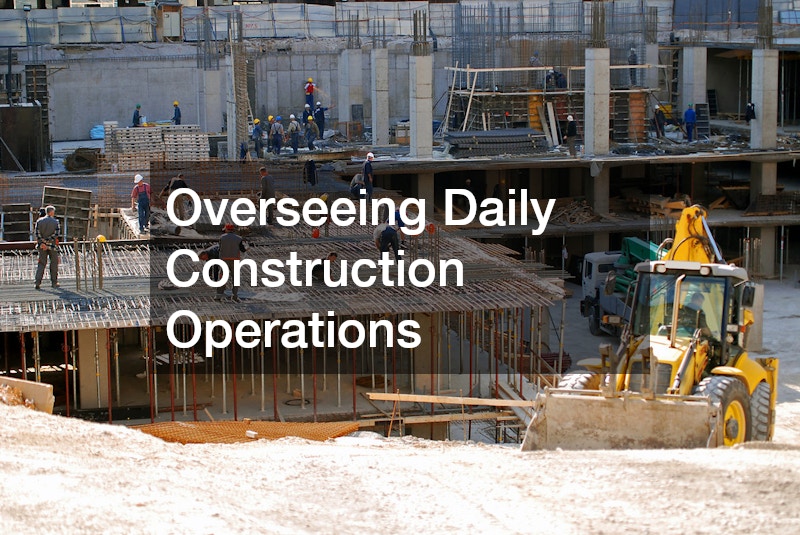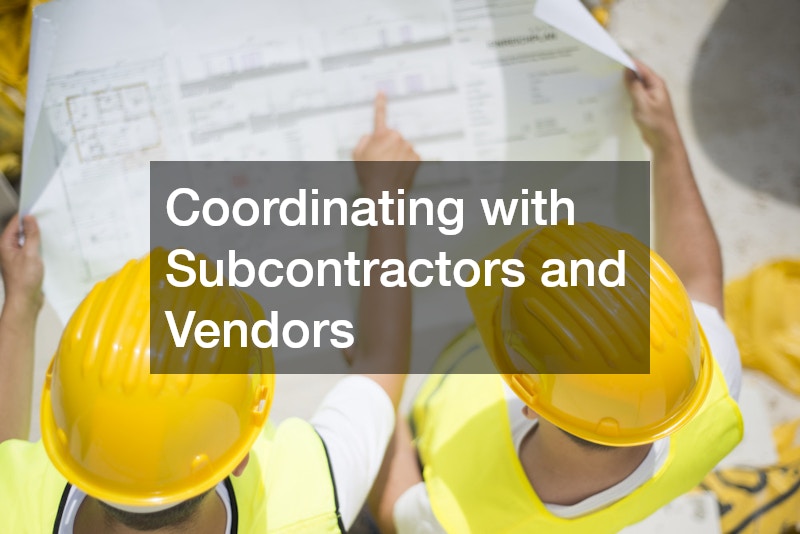The construction industry thrives on structure, leadership, and clear responsibilities. At the core of any successful building project is a superintendent who ensures that each phase—from ground-breaking to final inspection—unfolds with precision. While many associate superintendents with high-level oversight, their daily responsibilities are both broad and deeply involved, touching every corner of a jobsite. Whether it’s directing teams, coordinating logistics, or upholding safety regulations, the role demands both technical know-how of builder job duties and strong management capabilities.
For those exploring a leadership path in construction, understanding the key job duties is essential to success. These responsibilities shape not only how a site functions day-to-day but also how efficiently a project reaches completion. A well-prepared superintendent keeps operations running smoothly, tackles challenges proactively, and maintains clear communication among various stakeholders. Explore the core builder job duties that define the role and help prospective superintendents gain a practical view of what it takes to succeed in this demanding and rewarding career.
Whether you’re new to construction or transitioning from another industry role, gaining clarity about what superintendents actually do can help you plan your next steps more confidently. These builder job duties don’t just offer a checklist—they reflect the leadership and technical precision required to guide a complex, moving project to completion. In learning what’s expected at this level, you can better assess your readiness, identify areas for growth, and move forward with a deeper understanding of the superintendent’s critical role on the jobsite.
Overseeing Daily Construction Operations

One of the most fundamental duties involves the day-to-day oversight of the construction site. Superintendents must arrive early, ensure all crews are on task, and verify that work is progressing according to plan. This includes assigning priorities for the day, addressing delays, and solving problems as they arise. A superintendent is the first line of defense against miscommunication and disorganization, helping maintain productivity, efficiency, and momentum throughout the build. This ongoing supervision plays a critical role in reducing costly downtime and keeping every trade on the same page.
In more specific terms, daily operations may include monitoring specialized contractors, such as those delivering water well services to a remote build site. This requires coordination with utility providers, ensuring that the well installation complies with safety and environmental guidelines, and verifying that work proceeds without impacting the broader construction schedule. Because these tasks often happen in tandem with other critical operations, the superintendent must prioritize and manage workflows to avoid overlap and inefficiency. Builder duties in this area demand consistent attention and fast decision-making to maintain forward motion.
Managing On-Site Project Schedules
Keeping the entire project on schedule is another cornerstone of effective builder job duties. Superintendents must plan both short-term and long-term schedules, sequencing tasks so that each phase logically builds on the previous one. Delays in one area can quickly cascade into others, so careful calendar management is essential. This often involves anticipating issues, adjusting timelines in real-time, and constantly communicating with team leads to make sure everyone understands deadlines and expectations.
For example, a superintendent may need to plan the HVAC installation to align perfectly with the completion of the building envelope. If the site isn’t enclosed by a certain date, HVAC systems can’t be installed, leading to potential delays and rescheduling of trades. The superintendent must track these dependencies and adjust site activities to meet critical milestones. These duties require not only organization and communication, but also an in-depth understanding of construction sequencing and mechanical system requirements.
Coordinating with Subcontractors and Vendors

A superintendent serves as the central point of contact for all subcontractors and vendors on a jobsite, making coordination one of the most vital builder job duties. Because construction projects involve multiple trades—each with their own timelines, materials, and deliverables—it’s essential that everyone is aligned under one unified plan. Superintendents must build strong working relationships, manage expectations, and ensure that all parties follow project specifications and timelines. They also need to be prepared to mediate conflicts, clarify responsibilities, and step in when schedules begin to drift.
In a more detailed scenario, a superintendent may be responsible for ensuring that tool rentals are delivered and returned on time to support critical phases of work. For instance, certain trades may require specialty tools only available through rental providers. If those tools aren’t on-site when needed, work slows down or halts altogether. The superintendent must not only schedule delivery with vendors but also track usage and coordinate return logistics. These duties involve logistical finesse and a proactive approach to avoid downtime and cost overruns due to equipment delays.
Enforcing Safety Standards and Protocols
Maintaining a safe jobsite isn’t just a legal requirement—it’s a moral and operational responsibility. Among the core builder duties, enforcing safety protocols is one that directly impacts every worker’s well-being. Superintendents must stay updated on OSHA regulations, site-specific hazards, and company policies to ensure that safety is never compromised. From holding toolbox talks to conducting random inspections, the superintendent sets the tone for a safety-first culture. Clear signage, proper use of personal protective equipment (PPE), and thorough training are all elements that fall under their purview.
To illustrate, when overseeing concrete delivery on a busy jobsite, safety concerns become especially pronounced. The presence of large mixer trucks, narrow site access, and wet concrete creates a high-risk environment. The superintendent must coordinate this activity to limit exposure to moving equipment, manage pedestrian traffic, and make sure formwork is in place and properly braced. These builder duties demand vigilance and the authority to halt work if unsafe practices are observed, reinforcing the superintendent’s role as a guardian of the jobsite.
Reviewing Plans and Specifications

A deep understanding of blueprints and technical documents is a prerequisite for any superintendent, making the review of plans and specifications a foundational builder job duty. Every construction activity is governed by architectural and engineering drawings, product data, and scope descriptions. The superintendent must interpret these documents correctly, identify potential issues before they arise, and ensure the work on-site aligns with the approved designs. Misreading even a single detail can lead to costly errors, rework, and lost time.
For instance, during the installation of underground plumbing systems, the superintendent may need to double-check specifications that involve a drain cleaning plumber’s scope of work. Ensuring the layout and grade of pipes meet both plan and code requirements is critical before the slab is poured. If something is overlooked—such as access to cleanouts or venting placement—it could result in major delays or a failed inspection. These builder job duties involve a combination of technical knowledge, critical thinking, and the ability to foresee how one component affects the entire system.
Monitoring Quality Control Measures
Among the most essential builder duties is the responsibility to uphold quality standards throughout the construction process. A superintendent must routinely inspect completed work, verify materials meet specifications, and ensure that installations are performed according to code and contract documents. Quality control goes beyond just meeting basic expectations—it ensures that the final product is durable, safe, and aligned with the client’s vision. Neglecting this duty can lead to callbacks, failed inspections, or even structural issues down the road.
Take, for example, the supervision of a forklift operator unloading sensitive or high-value construction materials. If materials are damaged during unloading due to improper handling, it can compromise not just the quality but also the timeline of the project. The superintendent must observe these tasks, address improper techniques, and hold all parties accountable for following protocols. In this way, builder job duties related to quality control are not just reactive, but preventive—ensuring that every step of the build is executed with precision.
Communicating with Stakeholders and Clients

Strong communication skills are indispensable for superintendents, who often serve as the bridge between the jobsite and external stakeholders. Effective builder duties in this area include providing progress updates, managing expectations, and translating technical jargon into language that clients, architects, and investors can understand. Whether it’s via daily reports, weekly meetings, or on-the-spot discussions, clear communication helps keep projects on track and prevents misunderstandings from escalating into disputes.
For instance, when discussing the timeline and logistics of installing heavy equipment, the superintendent must relay detailed information to both the client and the relevant trade contractor. They must clarify when the equipment will arrive, how it will be integrated into the project, and what accommodations are needed on-site. This transparency builds trust and helps prevent friction between stakeholders. Builder job duties that emphasize communication help align all parties under a shared goal and keep the project moving in a coordinated fashion.
Handling Inspections and Compliance Issues
Navigating the inspection process and ensuring ongoing compliance with codes and regulations is another critical facet of builder job duties. Superintendents are responsible for preparing the site for both scheduled and unannounced inspections, addressing any violations, and maintaining accurate documentation. Compliance also includes adhering to environmental regulations, zoning laws, and permitting requirements. These responsibilities protect the project from legal setbacks and ensure that all work meets industry standards.
Consider a situation where a demolition service has just completed its portion of the project. The superintendent must inspect the cleared area, confirm debris was removed properly, and ensure no hazardous materials remain on-site. They must also prepare documentation for the municipal inspector and address any items flagged during the review. Builder duties in this realm require thoroughness, foresight, and a commitment to maintaining the integrity of both the project and its regulatory standing.
Managing Site Resources and Equipment
Effective resource management is one of the most practical builder job duties a superintendent must master. This includes tracking inventory, maintaining tools and machinery, and ensuring equipment is available when and where it’s needed. The superintendent must also anticipate shortages or delays, allocate materials efficiently across teams, and minimize waste. Proper resource planning helps keep the project running smoothly and prevents downtime caused by missing or malfunctioning equipment.
A good example of this duty in action is coordinating the use of a scissor lift during framing or mechanical installation. Because multiple trades may need access to the lift at different times, the superintendent must schedule its use strategically while also ensuring it’s safe, inspected, and properly maintained. Failing to manage this equipment can result in productivity losses or safety risks. These builder job duties involve both logistical planning and real-time decision-making to ensure the right resources are available at the right moment.
Resolving On-Site Conflicts and Delays
Construction sites are dynamic environments where unforeseen issues can disrupt progress. One of the more interpersonal builder job duties involves conflict resolution—whether between trades, vendors, or crew members. Superintendents must be adept at identifying tensions early, listening to all sides, and guiding teams toward practical solutions. This not only helps preserve team morale but also keeps the project from falling behind schedule due to unresolved disputes.
For example, if the plumbing crew delays grease trap installation, it may prevent the kitchen contractor from completing their work. Rather than allowing frustration to build, the superintendent must quickly intervene, reschedule tasks as needed, and communicate adjustments across teams. Duties like these require patience, leadership, and the ability to balance competing priorities without compromising the end goal.
Understanding the Full Scope of Superintendent Responsibilities
Becoming a successful superintendent means mastering a diverse set of builder duties that span operations, safety, communication, and coordination. Each task, whether it’s reviewing blueprints, managing subcontractors, or enforcing safety protocols, contributes to the larger goal of delivering a quality project on time and within budget. The role is not just about overseeing others—it’s about anticipating problems, solving them efficiently, and ensuring that every piece of the construction puzzle fits together.
For those considering this career path, understanding the full scope of builder duties offers a realistic preview of what lies ahead. It’s a demanding position that requires both technical expertise and leadership under pressure. But for individuals who thrive on challenge and enjoy seeing projects come to life from the ground up, the role of superintendent is not just a job—it’s a professional calling with lasting impact on every structure built under their watch.



